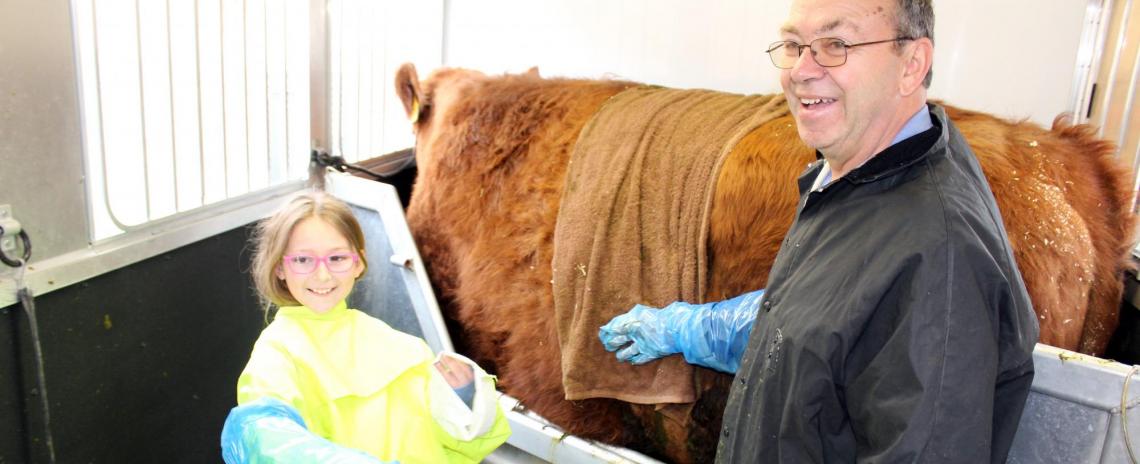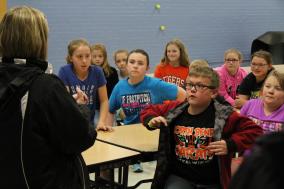Bovine, One-of-a-Kind Opportunity: UNL Mobile Beef Lab visits North Bend fourth-graders
Bovine, One-of-a-Kind Opportunity: UNL Mobile Beef Lab visits North Bend fourth-graders
By Tyler Dahlgren
NCSA Communications Specialist
There’s hands-on learning, a tried and true method of discovery proven to turn theory into concept.
And then there’s hands-in learning.
As in hands-in Rudy, a nine-year-old cannulated steer that travels the state providing a once-in-a-lifetime educational opportunity.
The first can be fun and, as the rapid spread of experiential learning spreads through the state indicates, highly beneficial to students.
The latter is just downright memorable.
Rudy, comfortably stationed in the University of Nebraska at Lincoln Mobile Beef Lab, rolled into the back parking lot of North Bend Central Elementary on Wednesday. He was greeted by two classrooms of fourth-graders, who would soon have the chance to acquaint themselves with the massive bovine in ways they’d likely never imagined.
Rudy’s fistula, or the hole on the left side of his stomach, looks uncomfortable and even painful. It is neither. But the hole does serve as a portal into Rudy’s digestive system, which includes his four-chambered stomach.
After a presentation from the UNL Mobile Beef Lab team, which reinforced the importance of agriculture to a group of students growing up in an ag-heavy area, the kids were garnered with a lab coat and armed with a large glove before plunging their arms into the depths of Rudy’s stomach. One by one.
The steer didn’t seem to mind, though the reaction from the North Bend Central students varied, and did so humorously.
“At North Bend, the kids are always very excited because we come every year, so we don’t have repeat students, we have new kids every year that may have heard about what a cool experience it is,” said Darci Pesek, who has been with the Mobile Beef Lab since the start. “Some of them are a little apprehensive, but once they go through it, they’ll say ‘Oh that was really cool!’ because it’s so different from anything they’ve done before.”
Pesek has been visiting schools with Rudy since 2012, but is in her first year coordinating visits. There is also a lab based out of North Platte, which visits schools in the western part of the state.
Her team is made up of county-based extension educators and extension assistants, all of whom have backgrounds in animal science.
“Darci is really good at putting the kids to ease and making connections with what we are doing in the classroom,” said fourth-grade teacher Bev Grueber. “We were talking about heredity and what makes us like we are. I told her we have been talking about systems of our body and we need you to help us compare our digestive system to that of a bovine, and I think she did a wonderful job of doing that.”
For the last handful of years, Grueber has helped line up visits from the beef lab. Some years, the kids want to get in line twice, and there’s also years where the kids decide examining the insides of a cow’s stomach just isn’t their cup of tea.
“One little girl who wanted to be a vet went up there and said ‘Oh, I don’t know if I can do this or not’,” Grueber recalls. “But she went ahead and did it and said ‘This isn’t probably going to be the worst thing a vet puts their hand in, is it?’ And I said ‘No, you’re probably right.’.”
The experience does produce entertaining reactions, but it also serves as an opportunity to learn about applicable concepts such as the science of the rumen digestive system, the human nutritional benefits of beef as a source of complete protein, and how agricultural lands in Nebraska are suited for livestock production.
The livelihood of many North Bend residents, Grueber said, relies on agriculture.
“There are 20 kids in my classroom, and I bet if we went around the room to see how many of their parents’ livelihood depended on agriculture, be it somebody who works in the bank, at Cargill, or on the farm, that number would be high,” Grueber said. “They just have to know how important agriculture is.”
And it’s important for kids to know where their food comes from, Pesek adds, and how agriculture effects their economy.
“A lot of them don’t realize the amount of animal byproduct they use on a daily basis, or how much agriculture plays into their local economy,” Pesek said. “If they want to go into agriculture, they don’t have to be what they traditionally think agriculture is, and it’s important they know that.”
When the beef lab left town, each student wrote a letter detailing what they learned, what they were surprised to find out, and additional questions to Pesek’s team. They immediately started to make comparisons between Rudy’s complex digestive system and their own.
“My kids look at that team that came last week as real scientists, and they come out of the experience saying ‘Oh my gosh, we worked with real scientists!’”, Grueber said. “By them working with people who work in science, that just kind of strengthens what we do in science. It opens up a lot of opportunities for careers, too, by just seeing that team. A scientist is not just someone who works in a lab.”
At the beginning of every school year, Grueber said, teachers have the chance to write grants for “out-of-the-box” learning activities like the UNL Mobile Beef Lab. Not once has she been showered with anything but support.
“We can read about it and look at pictures of it, but nothing can replace actually doing it,” Grueber said.
Is your school interested in a visit from the UNL Mobile Beef Lab? Drop by HuskerBeefLab.UNL.edu or email darci.pesek@unl.edu to schedule a visit!



